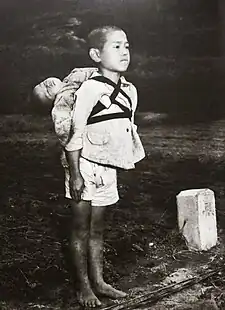
The Boy Standing by the Crematory (alternatively The Standing Boy of Nagasaki) is a historic photograph taken in Nagasaki, Japan, in September of 1945, shortly after the atomic bombing of that city on August 9, 1945. The photograph is of a boy of about 10 with his dead baby brother strapped to his back, waiting for his turn at the crematorium.
The photograph was taken by Joe O'Donnell, then working for the United States Marine Corps.[1]
I saw a boy about ten years old walking by. He was carrying a baby on his back. In those days in Japan, we often saw children playing with their little brothers or sisters on their backs, but this boy was clearly different. I could see that he had come to this place for a serious reason. He was wearing no shoes. His face was hard. The little head was tipped back as if the baby were fast asleep. The boy stood there for five or ten minutes.
The men in white masks walked over to him and quietly began to take off the rope that was holding the baby. That is when I saw that the baby was already dead. The men held the body by the hands and feet and placed it on the fire. The boy stood there straight without moving, watching the flames. He was biting his lower lip so hard that it shone with blood. The flame burned low like the sun going down. The boy turned around and walked silently away.— Joe O'Donnell[2]
O'Donnell made personal copies of his Nagasaki photographs and kept them hidden in a trunk until 1989, when he put together a traveling exhibit and a book. O'Donnell's Japan 1945, Images From the Trunk was published in Japan in 1995 and read widely.[3]
Efforts to determine the boy's identity
In 1979, Yoshitoshi Fukahori, who had been near the bombing and was still haunted by trauma from the events, began a lifelong effort of collecting photographs of the immediate aftermath.[4][5] When he saw the photograph of the boy, Fukahori began an effort to determine the boy's identity. He ultimately failed, but the photograph was also seen by one Masanori Muraoka.
Muraoka believed that he recognized the boy as a childhood playmate, although he had forgotten or never knew the boy's name. He also believed that he had met the boy after the bombing, carrying his dead brother on his back, and explaining "My mother isn't here". Muraoka undertook his own investigation to determine the boy's identity. Muraoka found a few minor possible clues, but he also failed, although he kept an extensive notebook of his efforts.[1]
A 50-minute[6] documentary film, Searching for the Standing Boy of Nagasaki ('焼き場に立つ少年'をさがして), was produced by NHK[7] and released on August 8, 2020.[8] The film described these efforts (as well as the experiences of "atomic bomb orphans" generally).[7] In 2021, the film was distributed in America by American Public Television.[6]
Further reading
- O'Donnell, Joe (2018). Japan 1945: A U.S. Marine's Photographs from Ground Zero. Vanderbilt University Press. ISBN 9780826516121.
References
- 1 2 Yuki Imano (August 28, 2019). "Nagasaki survivor donates notebook on his bid to identify boy in A-bomb photo". The Mainichi. Retrieved November 19, 2021.
- ↑ "A Japanese boy standing at attention after having brought his dead younger brother to a cremation pyre, 1945". Rare Historical Photos. 27 April 2014. Retrieved November 19, 2021.
- ↑ Tyge O'Donnell [interviewee] (August 6, 2007). "Dad's Images of Death". Las Vegas Review-Journal. Retrieved November 19, 2021.
- ↑ Junichiro Nagasawa (August 23, 2015). "At 86, trauma still plagues Nagasaki A-bomb survivor who couldn't save sister". Japan Times. Retrieved November 19, 2021.
- ↑ "Hibakusha: Octogenarian determined to tell own story about A-bomb at memorial ceremony". The Mainichi. August 2, 2017. Retrieved November 19, 2021.
- 1 2 "Searching for the Standing Boy of Nagasaki". Aptonline. APT (American Public Television). Retrieved November 19, 2021.
- 1 2 "Searching for the Standing Boy of Nagasaki". NHK World. NHK. Retrieved November 19, 2021.
- ↑ Searching for the Standing Boy of Nagasaki - Time and Tide | NHK WORLD-JAPAN On Demand, retrieved 2022-08-24